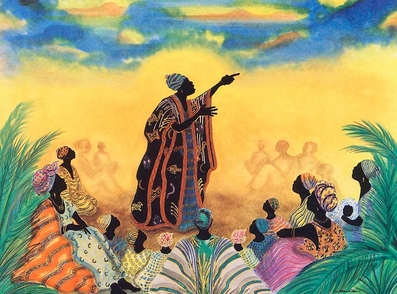
support@yorubalibrary.com
+2348073529208, 07038599574

Yoruba literature and oral tradition are cornerstones of Yoruba culture, preserving the rich history, values, and beliefs of the Yoruba people. This literary heritage encompasses a wide range of forms, from folktales and proverbs to poetry and historical narratives. In this article, we look into the essence of Yoruba literature and oral tradition, highlighting their significance and enduring impact.
Historical Background
Yoruba literature dates back centuries, with oral tradition serving as the primary means of cultural transmission. Before the advent of written records, stories, songs, and proverbs were passed down through generations by word of mouth. Griots, or traditional storytellers, played a crucial role in preserving and conveying this knowledge, ensuring that the community's history and wisdom remained alive.
Forms of Yoruba Literature
Folktales
Yoruba folktales are rich with moral lessons, often featuring animals and mythical beings as characters. These stories are designed to entertain and educate, imparting essential values and life lessons. Popular folktales include the adventures of Ìjàpá the tortoise, known for his cunning and wit.
Proverbs
Proverbs, or òwe, are a vital part of Yoruba oral tradition, encapsulating wisdom in concise, memorable phrases. They are used to offer advice, resolve disputes, and teach moral lessons.
Poetry
Yoruba poetry, or èwì, is a revered art form that celebrates beauty, emotion, and intellect. Poets use intricate language and rhythm to convey deep meanings and evoke powerful imagery. Oríkì, a type of praise poetry, honors individuals, families, and deities, recounting their achievements and virtues.
Historical Narratives
Historical narratives are oral accounts of significant events and figures in Yoruba history. These narratives preserve the memory of the past, ensuring that future generations understand their heritage and identity. They often highlight the deeds of legendary kings and heroes.
Significance of Oral Tradition
Oral tradition is the lifeblood of Yoruba culture, serving several crucial functions:
1. Cultural Preservation: Oral tradition safeguards the community's history, beliefs, and values, ensuring their continuity.
2. Education: Through stories, proverbs, and poetry, oral tradition educates young and old, imparting knowledge and moral guidance.
3. Entertainment: Folktales and poetry provide entertainment, fostering a sense of community and shared identity.
4. Spiritual Connection: Oral tradition connects the Yoruba people to their spiritual beliefs, celebrating deities and ancestral spirits through storytelling and praise poetry.
Modern Influence
Yoruba literature and oral tradition continue to thrive in the modern era, adapting to contemporary forms and media. Writers, poets, and performers draw inspiration from traditional sources, creating new works that resonate with today's audiences. The integration of oral tradition into literature, film, and music ensures that Yoruba cultural heritage remains vibrant and relevant.
Conclusion
Yoruba literature and oral tradition are foundational to the Yoruba cultural identity, offering a window into the past and guiding principles for the present. Through folktales, proverbs, poetry, and historical narratives, the Yoruba people celebrate their heritage and impart valuable lessons. As these traditions evolve and adapt, they continue to enrich the cultural tapestry of the Yoruba community and beyond.

Learn about the Yoruba concept of Ìwà Pẹ̀lẹ́ (good…

Learn special praises for Divine Being and Creator…